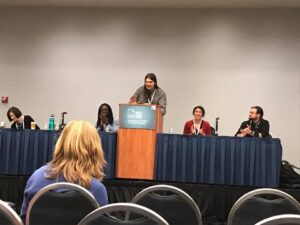The primary purpose of the ASLE Mentoring Program is to offer graduate students and early career scholars career guidance and other forms of professional support. Some examples include guidance in academic scholarship or creative writing, service as outside readers on dissertation committees, help navigating the job market, advice for publishing, and support for faculty members in early career tenure-track and precarious positions.
If you are interested in becoming a mentor, please fill out our intake form. If you are an ASLE member and would like to work with a mentor, please fill out an application.
If you have questions about the Mentoring Program, please contact Mentoring Program Co-Coordinators Juliana Chow (juliana.chow@utah.edu) and Megan Kaminski (kaminski@ku.edu).
 To read more about how the ASLE mentoring program helped participants in the past, see this interview with former mentee and now current mentor Clinton Peters.
To read more about how the ASLE mentoring program helped participants in the past, see this interview with former mentee and now current mentor Clinton Peters.
Megan: Could you tell us about your ASLE mentoring experience (as a mentee)?
Clinton: Getting to meet Megan at a coffee shop in Moscow, Idaho was really cool. I was still a grad student, but she was already a professor and had a book coming out. I think it reinforced the idea that all writers are just people. We are on our own paths, and thinking in terms of hierarchy is misguided. It was also really cool to get feedback on my work from someone with a close eye like Megan.
Megan: Now that it has been almost 10 years since you participated in the mentoring program, what have been some of the lasting impacts from being part of it?
Clinton: I think the biggest impact now is treating my students who have the drive I believe I had then as young colleagues instead of just time-consuming students. Not that students aren’t great in their own ways.
Megan: And you’ve been a professor at Berry College since 2018—congratulations! You’ve agreed to be a mentor for the program and we very much appreciate that. What are you looking forward to sharing with your mentee?
Clinton: I think I have learned the hard way that I can’t talk down to anyone or try to share anything that is not wanted. So, I’m really interested in what gaps in the mentee’s game plan I can help clarify. I think it is also immeasurably valuable to help demystify the writing process however you can. I was mostly an autodidact when it comes to publishing. I am happy to talk about that part of the writing world. Finally, I want to learn from them as well, and I don’t mean this superficially.
Juliana: Megan, could you tell us about your ASLE mentoring experience (as a mentor)?
Megan: I was a pretty young professor when I was invited to participate in the mentorship program, so in some ways I was surprised and flattered to be thought of as a potential mentor. It was a delight to connect with Clinton, to give him feedback on his work, and to help him to see that the next steps in his publishing and career trajectory were completely attainable.
Why at this point in your career have you decided to help coordinate the ASLE mentoring program? Why have you decided to give back to the profession?
Juliana: I think it’s impossible to keep going in academia without a community around you. And mentors are critical people in that community. When I was early on in my academic career as a young professor, I didn’t know how to cultivate a community or seek out mentors even though I ostensibly knew I should and even attended workshops about this. It’s hard to keep a community going and it’s also hard to build one from scratch when you move from grad school to a new institution far away from anyone you know.
After struggling with that and now being, perhaps, a mid-career academic who has had a somewhat off-kilter career trajectory, I wanted to help others who might be feeling how I did.
How about for you, Megan?
Megan: As a graduate student and young poet and then young professor–and now as a midcareer poet/professor, I receive some of the best mentoring through informal relationships, outside of departmental structures. So I’m excited to help facilitate these connections for grad students and early career scholars. We often don’t receive the mentorship that we need at our home institutions, whether due to field specializations, availability, or differences in personality and experiences.
Thanks everyone for sharing your experiences with ASLE’s mentoring program!
